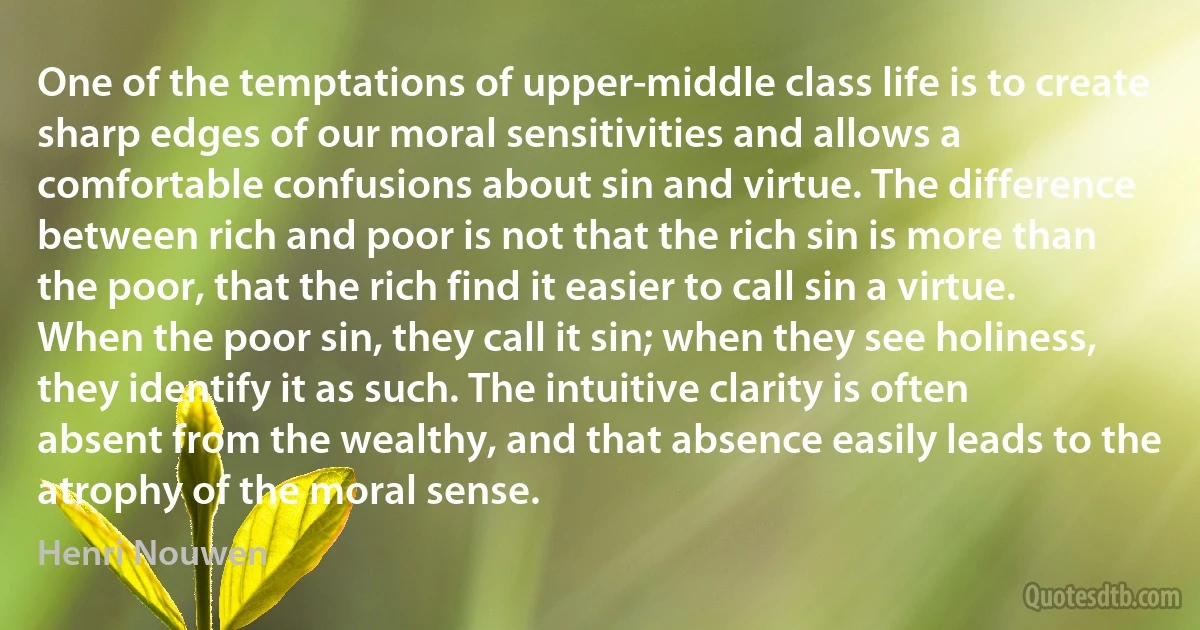Wealthy Quotes - page 18
I want to reform the tax code so that it's simple, fair, and asks the wealthiest households to pay higher taxes on incomes over $250,000 - the same rate we had when Bill Clinton was president; the same rate we had when our economy created nearly 23 million new jobs, the biggest surplus in history, and a lot of millionaires to boot.

Barack Obama
Ye are born, all of you, to a royal birthright. Scorn not the poor, thou wealthy - his toil is nobler than thy luxury. Fret not at the rich, thou poor - his beneficence is comelier than thy murmuring. Join hands, both of you, rich and poor together, as ye toil in the brotherhood of God's great harvest-field - heirs of a double heritage - thou poor, of thy kingly labor - thou rich, of thy queenly charity - and let heaven bear witness to the bridal.

William Morley Punshon
A wise Government, allying itself with religion, would, as it were, consecrate society and sanctify the State. But how is this to be done? It is the problem of modern politics which has always most embarrassed statesmen. No solution of the difficulty can be found in salaried priesthoods and complicated concordats. But by the side of the State in England there has gradually arisen a majestic corporation wealthy, powerful, independent with the sanctity of a long tradition, yet sympathising with authority, and full of conciliation, even deference, to the civil power. Broadly and deeply planted in the land, mixed up with all our manners and customs, one of the main guarantees of our local government, and therefore one of the prime securities of our common liberties, the Church of England is part of our history, part of our life, part of England itself.

Benjamin Disraeli
To the Legislative Assembly belongs the consideration of measures which may best tend to the development of the resources of the Territory. Oregon possesses within herself many of these, which with enterprise and industry will most surely render her a wealthy, powerful, and prosperous State. She has a fertile soil, and genial climate; she has [vast] forests and abundant fisheries, unlimited water power, pastures upon which even during winter, innumerable flocks and herds can subsist, with no other care than the mere herding; and prairies which could with only moderate labor, furnish the whole of our Pacific Territories with bread.

John P. Gaines
Britain kept its position as the dominant world power well into the 20th century despite steady decline. By the end of World War II, dominance had shifted decisively into the hands of the upstart across the sea, the United States, by far the most powerful and wealthy society in world history.

Noam Chomsky
All fashionable clothes, as Thorstein Veblen has pointed out in his Theory of the Leisure Class (1899), are highly symbolic: materials, cut, and ornament are dictated only to a slight degree by consideration of warmth, comfort, or practicability. The more we dress up in fine clothes, the more we restrict our freedom of action. But by means of delicate embroideries, easily soiled fabrics, starched shirts, high heels, long and pointed fingernails. and other such sacrifices of comfort, the wealthy classes manage to symbolize, among other things, the fact that they don't have to work for a living.

S. I. Hayakawa
A country is strong which consists of wealthy families, every member of whom is interested in defending a common treasure; it is weak when composed of scattered individuals, to whom it matters little whether they obey seven or one, a Russian or a Corsican, so long as each keeps his own plot of land, blind in their wretched egotism, to the fact that the day is coming when this too will be torn from them.

Honoré de Balzac
But perhaps the most significant factor in the turn to a Greek ethnicism, which resisted both the Turkish turban and the Latin mitre in the years before the fall of Constantinople, was the opposition of the urban populace, led by the Orthodox party, monks, and priests, to the wealthy urban classes and the Byzantine court. After the Ottoman conquest in 1453, recognition by the Turks of the Greek millet under its Patriarch and Church helped to ensure the persistence of a separate ethnic identity, which, even if it did not produce a ‘precocious nationalism' among the Greeks, provided the later Greek enlighteners and nationalists with a cultural constituency fed by political dreams and apocalyptic prophecies of the recapture of Constantinople and the restoration of Greek Byzantium and its Orthodox emperor in all his glory.

Anthony D. Smith
In a way, these people have a point. My family name is only Escudero. I don't have the same pedigree of Quezon, Roxas, or Osmeña families, of those who have become presidents, heroes or wealthy philanthropists. The Senate is the highest elected position that someone from my family has ever reached, and even this, I never imagined I might achieve.

Francis Escudero
This is where I would like to bring up the subject of equity. Economic statistics show that although there has been GDP growth over the past 23 years, the number of families living in poverty has increased - up to about 5 million families or 27.6 million people. This demonstrates that benefits of that growth have accrued to the wealthy. The rich have gotten richer and the poor have gotten poorer. This is clearly unacceptable to all of us.

Francis Escudero
A penetrating observer of social problems has pointed out recently that whereas wealthy families once were the chief benefactors of the universities, now industry has taken over this role. Support of education is something no one quarrels with-but this need not blind us to the fact that research supported by pesticide manufacturers is not likely to be directed at discovering facts indicating unfavorable effects of pesticides.

Rachel Carson
Every year Congress and the president sign laws that make us do more things and gives us less money to do it with. I see people in my state, middle-class people - their taxes have gone up in Washington and their services have gone down while the wealthy have gotten tax cuts. I have seen what's happened in this last four years when - in my state, when people lose their jobs there's a good chance I'll know them by their names. When a factory closes, I know the people who ran it. When the businesses go bankrupt, I know them. And I've been out here for 13 months meeting in meetings just like this ever since October, with people like you all over America, people that have lost their jobs, lost their livelihood, lost their health insurance.

Bill Clinton
In the year 1984 Forbes magazine, a leading periodical for high finance and big business, drew up a list of the wealthiest individuals in the United States. The top 400 people had assets totaling $60 billion. At the bottom of the population there were 60 million people who had no assets at all. Around the same time, the economist Lester Thurow estimated that 482 very wealthy individuals controlled (without necessarily owning) over $2,000 billion ($2 trillion). Consider the influence of such a very rich class-with its inevitable control of press, radio, television, and education-on the thinking of the nation.

Howard Zinn



